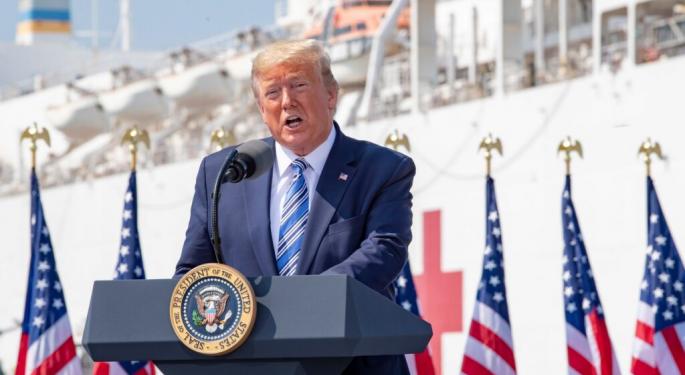Appeals Court Allows Trump's Tariffs To Remain In Effect While It Reviews The Lower Court's Decision
A federal appeals court allowed President Donald Trump‘s sweeping tariffs to remain in effect Tuesday while reviewing the lower court decisions that blocked the duties on constitutional grounds.
What Happened: The U.S. Court of Appeals for the Federal Circuit granted a temporary stay, preserving Trump’s “Liberation Day” tariffs on most trading partners and separate duties on Canada, China and Mexico. The court scheduled oral arguments for July 31 and ordered the full 11-member panel to hear the case due to its “exceptional importance.”
The decision reverses two lower-court rulings that struck down the tariffs. On May 28, the U.S. Court of International Trade ruled unanimously that Trump exceeded his authority by using the International Emergency Economic Powers Act (IEEPA) to impose the duties. The three-judge panel stated the Constitution grants Congress, not the president, the power to levy tariffs.
A separate federal district court in Washington blocked the emergency tariff authority, with Judge Rudolph Contreras writing that IEEPA “does not grant Trump the authority to impose or adjust tariffs without approval from Congress.”
Why It Matters: The tariffs generate approximately $200 billion annually and include 10% across-the-board duties, 20% on Chinese imports, and 25% on non-USMCA goods from Canada and Mexico. The fluctuating nature has created market volatility and supply chain disruptions for companies managing production and pricing strategies.
Trump cited fighting fentanyl trafficking and addressing trade deficits as justification for the tariffs under IEEPA, historically used for sanctions rather than trade duties. Jeffrey Schwab, attorney for affected small businesses, said, “every court to rule on the merits so far has found these tariffs unlawful.”
Goldman Sachs analysts noted Trump could reimpose similar tariffs “within days” using Section 122 trade law, which allows 15% tariffs for 150 days without congressional approval. The ruling has no impact on tariffs levied under traditional legal authority, such as steel and aluminum duties.
Read Next:
Disclaimer: This content was partially produced with the help of AI tools and was reviewed and published by Benzinga editors.
Photo courtesy: Rawpixel.com / Shutterstock.com
© 2025 Benzinga.com. Benzinga does not provide investment advice. All rights reserved.
Posted-In: Donald Trump IEEPA Tariff tariffsPolitics



